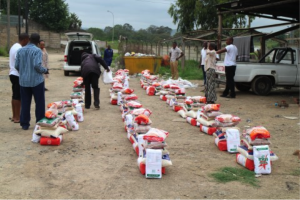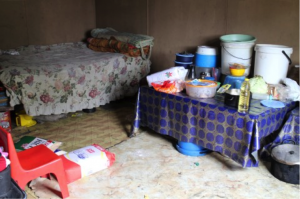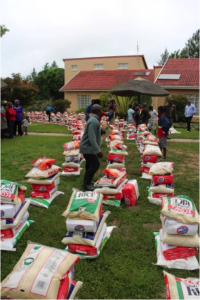Food Distributions Report
A firsthand report from Reverend Spiwo Xapile regarding the two communities AIAIA serves in the Eastern Cape.
Background  Unlimited Regular Access to sufficient food is the right of all South Africans, however today many South Africans are vulnerable to food insecurity, leading to nutritional problems such as low body weight, and micronutrient malnutrition. Recent research by the Human Science Research Council (HSRC) has shown that more than half of the country’s population has limited regular access to enough food- on a total national level; two out of four households in the country are food secure that is 45.6%. In 2012 research revealed that the Eastern Cape, followed by Limpopo, had the highest numbers of citizens experiencing food insecurity (HRS, 2013).Communities such as Etipini and Malungeni are even worse off as they are situated far from the Central viable Business Districts, thus making it even more difficult for members of these communities to find employment to break the cycle of poverty and better their living conditions. It is initiatives like the emergency food distributions that contribute towards the betterment of these communities by forming partnerships and working together with the communities to change their lives for the better and gearing them towards self-reliance.
Food Distribution at eTipini Informal Settlement
During the December Christmas season volunteers from the Malungeni Village and the eTipini informal settlement packed and distributed emergency food parcels
in these communities. These communities are burdened by challenges such as unemployment, lack of food, crime, poor service delivery, HIV/AIDS, substance abuse, gender discrimination and gender based violence. The response to these challenges by the communities has been different as one community, Malungeni, adopts an asset-based approach to their situation by working together; another, eTipini, is still held back by the negativity around them and battling with their reality.
Unlimited Regular Access to sufficient food is the right of all South Africans, however today many South Africans are vulnerable to food insecurity, leading to nutritional problems such as low body weight, and micronutrient malnutrition. Recent research by the Human Science Research Council (HSRC) has shown that more than half of the country’s population has limited regular access to enough food- on a total national level; two out of four households in the country are food secure that is 45.6%. In 2012 research revealed that the Eastern Cape, followed by Limpopo, had the highest numbers of citizens experiencing food insecurity (HRS, 2013).Communities such as Etipini and Malungeni are even worse off as they are situated far from the Central viable Business Districts, thus making it even more difficult for members of these communities to find employment to break the cycle of poverty and better their living conditions. It is initiatives like the emergency food distributions that contribute towards the betterment of these communities by forming partnerships and working together with the communities to change their lives for the better and gearing them towards self-reliance.
Food Distribution at eTipini Informal Settlement
During the December Christmas season volunteers from the Malungeni Village and the eTipini informal settlement packed and distributed emergency food parcels
in these communities. These communities are burdened by challenges such as unemployment, lack of food, crime, poor service delivery, HIV/AIDS, substance abuse, gender discrimination and gender based violence. The response to these challenges by the communities has been different as one community, Malungeni, adopts an asset-based approach to their situation by working together; another, eTipini, is still held back by the negativity around them and battling with their reality.
 The Etipini community was established for people who previously moved from living at a Rubbish Dump Site and the municipality had relocated them to their “new living quarters”. The place looked like an old construction site that had been deserted. This place that they have been forced to call home is not what anyone would choose to call such. Containers are set up as hostels to accommodate two families (up to 15 people per family) per container.
Upon our arrival on the day of distribution we witnessed a sense of hopelessness from this community as many people were consuming alcohol before noon, leaving their children playing outside in the rat infested field with no supervision.
Although they had all come from the same place and are experiencing the same challenges, there is no sense of community, rather a sense of “we are all in this for ourselves.” The desperate conditions seem to encourage alcoholism as people try to drown their problems while some of the young men are also pushed into crime as evidenced by a young man who had just been released from jail. Children are unable to attend school due to the long-distances from home and are therefore only creating another cycle of poverty and unemployment. Furthermore, there are a number of toddlers who reside with their parents in unhygienic places and keeping them healthy has to be a challenge.
The Etipini community was established for people who previously moved from living at a Rubbish Dump Site and the municipality had relocated them to their “new living quarters”. The place looked like an old construction site that had been deserted. This place that they have been forced to call home is not what anyone would choose to call such. Containers are set up as hostels to accommodate two families (up to 15 people per family) per container.
Upon our arrival on the day of distribution we witnessed a sense of hopelessness from this community as many people were consuming alcohol before noon, leaving their children playing outside in the rat infested field with no supervision.
Although they had all come from the same place and are experiencing the same challenges, there is no sense of community, rather a sense of “we are all in this for ourselves.” The desperate conditions seem to encourage alcoholism as people try to drown their problems while some of the young men are also pushed into crime as evidenced by a young man who had just been released from jail. Children are unable to attend school due to the long-distances from home and are therefore only creating another cycle of poverty and unemployment. Furthermore, there are a number of toddlers who reside with their parents in unhygienic places and keeping them healthy has to be a challenge.
 A total of 61 food parcels were distributed to families in the community, with an average of 15 members per family. The parcels contained Samp, beans, maze meal, flour, rice, a chicken pack, cooking oil and a packet of chocolates. As volunteers prepared the parcels for distribution, members started rushing outside, pushing to get to the front so that they could get the parcels first as they waited impatiently for distributions to begin. At some stage the distributors were frightened for their safety, worried that if the food parcels were not enough for everyone some community members might attack them. This was after being threatened by some young men who were not on the list of those receiving the emergency food parcels as they had just come back from prison.
We also had three volunteers who came from Johannesburg, one originally from Kenya. They describe their experience of eTipini as both sad and heart-warming. Sad in the sense that conditions that the people are living in were far too devastating. Our Kenyan volunteer made the comment that although he had witnessed hardship in Kenya where he came from; it was hard to believe that there were people in South Africa who suffered that much. “My experience of Life in Johannesburg has mainly been limited to the northern suburbs… and now that we were away from the glamour of Sandton I am exposed to the devastating realities of the experience of many rural South Africans”.
A total of 61 food parcels were distributed to families in the community, with an average of 15 members per family. The parcels contained Samp, beans, maze meal, flour, rice, a chicken pack, cooking oil and a packet of chocolates. As volunteers prepared the parcels for distribution, members started rushing outside, pushing to get to the front so that they could get the parcels first as they waited impatiently for distributions to begin. At some stage the distributors were frightened for their safety, worried that if the food parcels were not enough for everyone some community members might attack them. This was after being threatened by some young men who were not on the list of those receiving the emergency food parcels as they had just come back from prison.
We also had three volunteers who came from Johannesburg, one originally from Kenya. They describe their experience of eTipini as both sad and heart-warming. Sad in the sense that conditions that the people are living in were far too devastating. Our Kenyan volunteer made the comment that although he had witnessed hardship in Kenya where he came from; it was hard to believe that there were people in South Africa who suffered that much. “My experience of Life in Johannesburg has mainly been limited to the northern suburbs… and now that we were away from the glamour of Sandton I am exposed to the devastating realities of the experience of many rural South Africans”.
 It was however heart-warming in that those receiving Emergency Food Aid could not hide their happiness and appreciation of food received. At the end day we were happy to be part of a great initiative, “contributing towards something that would not only fill their stomach’s will food but hopefully also their hearts with love, hope for a better future that can only be secured by those who continue to be the voice of those that have lost their voices” said one of the volunteers in appreciation of what those that had made this food distribution possible in this case ArminArminAfrica.
There were members who were unable to come and fetch their parcels due to illness; one of those was a family in which a son and a mother were both ailing from HIV AIDS. The mother had contracted the disease while nursing her son. Had there not been any house visitation done by the volunteers, these people would have missed out on needed assistance. By the way they are informed long before this distribution is that and they would make sure they are around when it happens. What also came as a shocking surprise was the lady who was one of the first people to receive their parcels and a few minutes later, to the surprise of everyone in the community, she was outside her shack already eating her chicken. “I think about this a lot and wonder if she had her pot of water boiling whist waiting for the distribution for some time. What would have happened if we had, for some reason, not come that morning?
Food Distribution in the Malungeni community
It was however heart-warming in that those receiving Emergency Food Aid could not hide their happiness and appreciation of food received. At the end day we were happy to be part of a great initiative, “contributing towards something that would not only fill their stomach’s will food but hopefully also their hearts with love, hope for a better future that can only be secured by those who continue to be the voice of those that have lost their voices” said one of the volunteers in appreciation of what those that had made this food distribution possible in this case ArminArminAfrica.
There were members who were unable to come and fetch their parcels due to illness; one of those was a family in which a son and a mother were both ailing from HIV AIDS. The mother had contracted the disease while nursing her son. Had there not been any house visitation done by the volunteers, these people would have missed out on needed assistance. By the way they are informed long before this distribution is that and they would make sure they are around when it happens. What also came as a shocking surprise was the lady who was one of the first people to receive their parcels and a few minutes later, to the surprise of everyone in the community, she was outside her shack already eating her chicken. “I think about this a lot and wonder if she had her pot of water boiling whist waiting for the distribution for some time. What would have happened if we had, for some reason, not come that morning?
Food Distribution in the Malungeni community The Malungeni community is different, although this community also faces similar challenges to that of the eTipini community, one could feel the sense of togetherness among the community members. A total of 130 emergency food parcels were distributed to families in the community of Malungeni. It was quite evident that this community is committed towards changing their lives for the better. On the morning of the emergency food distribution (EFD) young boys came to clean the area where the food would be packed and stayed to help unload the food from a huge truck. There were young men and women who were there to help with sorting out the parcels. The Older members of the community were accompanied by their children with wheel-barrows and there were also those who did not have children, and they were accompanied by other community members.
The people have become accustomed to how this process works and always there early, ready to lend hands to make sure the process is quick and painless. There is an enormous sense of community where people are there for each other and know that what gets them the food parcels is the community work and a commitment to taking care of their friends and supporters whenever they visit. Throughout the process there are laughs and smiles and jokes that are being passed around. It is a great place to be and something great to witness.
The gesture to give food parcels to the families was touching. For most, if not all, of them the food would go a long way to avert days that they would have gone hungry. What was even more touching was talking to people who came later to show their appreciation for the parcels they were given. We also visited an elderly couple that was very appreciative of this intervention.
This was a great experience for everyone involved, an eye opener to those that came from outside these two communities.
The Malungeni community is different, although this community also faces similar challenges to that of the eTipini community, one could feel the sense of togetherness among the community members. A total of 130 emergency food parcels were distributed to families in the community of Malungeni. It was quite evident that this community is committed towards changing their lives for the better. On the morning of the emergency food distribution (EFD) young boys came to clean the area where the food would be packed and stayed to help unload the food from a huge truck. There were young men and women who were there to help with sorting out the parcels. The Older members of the community were accompanied by their children with wheel-barrows and there were also those who did not have children, and they were accompanied by other community members.
The people have become accustomed to how this process works and always there early, ready to lend hands to make sure the process is quick and painless. There is an enormous sense of community where people are there for each other and know that what gets them the food parcels is the community work and a commitment to taking care of their friends and supporters whenever they visit. Throughout the process there are laughs and smiles and jokes that are being passed around. It is a great place to be and something great to witness.
The gesture to give food parcels to the families was touching. For most, if not all, of them the food would go a long way to avert days that they would have gone hungry. What was even more touching was talking to people who came later to show their appreciation for the parcels they were given. We also visited an elderly couple that was very appreciative of this intervention.
This was a great experience for everyone involved, an eye opener to those that came from outside these two communities.
